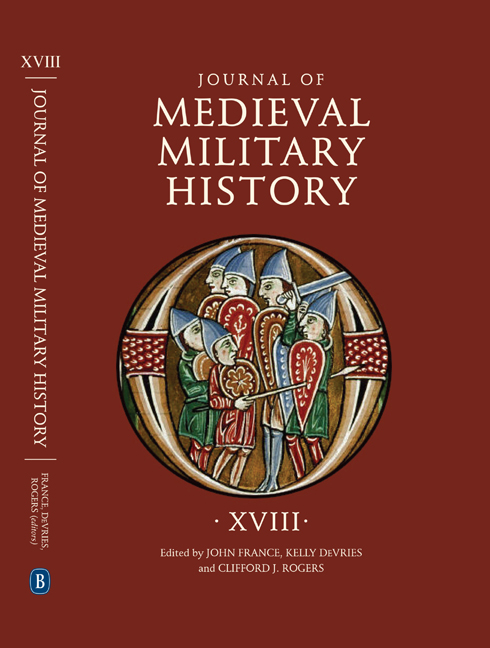Book contents
- Frontmatter
- Contents
- List of Illustrations
- 1 The Eastern Campaigns of King Henry II of Germany, 1003–17
- 2 Peace, Popular Empowerment and the First Crusade
- 3 The Transformation of Naval Warfare in Scandinavia during the Twelfth Century
- 4 Auxiliary Peoples and Military Reform on Hungary’s Western Frontier in the Thirteenth Century
- 5 What Types of Sources Did Medieval Chroniclers Use to Narrate Battles? (England and France, Twelfth to Fifteenth Centuries)
- 6 Experimental Tests of Arrows against Mail and Padding
- 7 Four Misunderstood Gunpowder Recipes of the Fourteenth Century
- 8 The Earliest Middle English Recipes for Gunpowder
- 9 Horses and Horsemen in Fifteenth-Century Siege Warfare, with Particular Reference to the Later Hundred Years War
- 10 Supplying the Army: The Siege of Pisa, 1499
- List of Contributors
- Journal of Medieval Military History 1477–545X
2 - Peace, Popular Empowerment and the First Crusade
Published online by Cambridge University Press: 06 October 2020
- Frontmatter
- Contents
- List of Illustrations
- 1 The Eastern Campaigns of King Henry II of Germany, 1003–17
- 2 Peace, Popular Empowerment and the First Crusade
- 3 The Transformation of Naval Warfare in Scandinavia during the Twelfth Century
- 4 Auxiliary Peoples and Military Reform on Hungary’s Western Frontier in the Thirteenth Century
- 5 What Types of Sources Did Medieval Chroniclers Use to Narrate Battles? (England and France, Twelfth to Fifteenth Centuries)
- 6 Experimental Tests of Arrows against Mail and Padding
- 7 Four Misunderstood Gunpowder Recipes of the Fourteenth Century
- 8 The Earliest Middle English Recipes for Gunpowder
- 9 Horses and Horsemen in Fifteenth-Century Siege Warfare, with Particular Reference to the Later Hundred Years War
- 10 Supplying the Army: The Siege of Pisa, 1499
- List of Contributors
- Journal of Medieval Military History 1477–545X
Summary
Despite the ongoing debate among scholars as to the strength of the causal relationship between eleventh-century popular movements and the launching of the crusades, there has been virtually no consideration of how these trends may have impacted military success during the expeditions themselves. This work establishes a foundation for that research by investigating two areas. First, it examines the Peace of God, free canonical elections, and the communes through the lens of popular involvement, demonstrating how each built upon the former to increase empowerment among the French and Italian people during the eleventh-century. Second, by investigating three populist aspects of the First Crusade, the article assesses how those developments affected military success abroad. Those aspects include: consultative leadership and interclass cooperation; proactive popular assemblies; and the reactive populace's role in conflict resolution. Building on the scholarship of France, Ott, Landes, Kostick and Koziol, the article employs contextual and linguistic scrutiny of key passages to establish connections between the movements back in Europe and to populist trends noted in the crusade chronicles.
In considering the causal factors which inspired thousands of Europeans to embark upon the First Crusade, historians have long pointed towards a string of empowering popular movements unique to the eleventh century. The peace, communal and reform movements have been seen as paving the road to Clermont. Far less often, however, have either medieval or military historians examined how the eleventh-century wave of popular empowerment played out during the First Crusade itself.
In order to examine this relationship adequately, it is first necessary to investigate the string of religious and political evolutions chronologically: the Peace of God, the Gregorian Reformation, and finally the commune movement. These movements increased political awareness and capability throughout the lower social orders, and taught the populus to enforce conflict resolution upon their social betters.
Having analyzed the events of the pre-crusade era, I shall return to the expedition to examine how Europe's masses turned their century of domestic empowerment into foreign military success. Peering through an assortment of chronicler lenses, I shall look at four questions. First, how did the voluntary tapping of popular will manifest itself through leader selection processes on crusade?
- Type
- Chapter
- Information
- Journal of Medieval Military HistoryVolume XVIII, pp. 37 - 80Publisher: Boydell & BrewerPrint publication year: 2020

